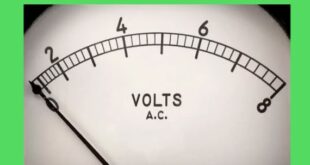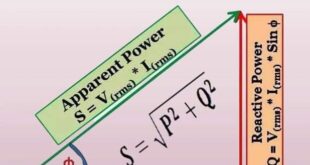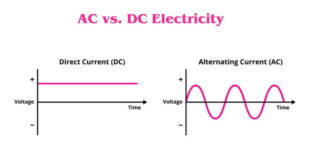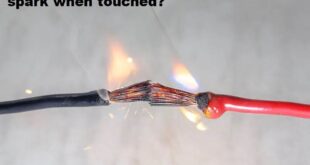Answer: Yes, ground typically refers to a reference point with zero voltage. Reasoning: In electrical engineering, ground is often used as a reference point for voltage measurements. It’s conventionally assumed to have zero voltage because it’s connected to the Earth, which acts as a large reservoir of charge. By connecting …
Read More »Tag Archives: voltage
Why is Megger used instead of a multimeter for insulation testing?
Answer: Megger is preferred over a multimeter for insulation testing because it applies a higher voltage, typically 500V or more, which is necessary to accurately assess the insulation resistance and detect potential faults. Reasoning: Insulation testing requires the application of a higher voltage to accurately measure the resistance of insulation …
Read More »Electrical Power – Its Types and Units
Electrical Power – Its Types and Units Introduction Electrical power is a fundamental concept that plays a pivotal role in modern society. From lighting our homes to powering vast industries, electrical power has become an indispensable part of our daily lives. In this article, we will explore what electrical power …
Read More »Multimeter Types and Their Applications
Multimeter Types and Their Applications Introduction Multimeters are indispensable tools used in various fields that involve electrical measurements. They play a vital role in diagnosing electrical problems, troubleshooting circuits, and ensuring accurate measurements of voltage, current, resistance, and other electrical parameters. Understanding the different types of multimeters and their applications …
Read More »Basic Concepts and Definitions of Electronics
Understanding Basic Concepts and Definitions of Electronics Introduction Electrical and electronics engineering is a fascinating field that powers the technology-driven world we live in. In this introductory chapter, we will explore some fundamental concepts that serve as the building blocks for understanding and working with electricity and electronics. Understanding these …
Read More »Types of Electricity: AC vs. DC
Types of Electricity: AC vs. DC Electricity comes in various types, and one common way to categorize it is based on the flow of electric charge. The two primary types of electricity are Alternating Current (AC) and Direct Current (DC). Let’s explore the characteristics and applications of each: 1. Alternating …
Read More »Which current is harmful AC or DC?
Answer: Both AC and DC can be harmful, but the severity of harm depends on various factors like voltage, current, and duration of exposure. Reasoning: he harmfulness of a current depends on factors such as voltage, current intensity, and duration of exposure. Both AC (alternating current) and DC (direct current) …
Read More »Does voltage or current cause heat?
Answer: Current causes heat. When current flows through a resistive material, it encounters resistance, leading to the generation of heat according to Joule’s Law (P = I²R). Reasoning: Voltage represents the force that drives current, and resistance impedes the flow of current. When current encounters resistance (R), it experiences a …
Read More »Which is more powerful voltage or current?
Answer: Voltage and current are different aspects of electrical systems. Neither is inherently more powerful than the other; their significance depends on the context and application. Reasoning: Voltage and current are fundamental electrical quantities. Voltage (measured in volts) is the potential energy per unit charge, while current (measured in amperes) …
Read More »Can voltage be lost as heat?
Answer: Yes, voltage can be lost as heat due to resistance in a conductor. -= Can voltage be lost as heat Reasoning: Voltage is the electric potential difference that drives the flow of electric current. When current passes through a conductor with resistance, such as a wire, some energy is …
Read More »Why current is better than voltage?
Answer: Current is not inherently “better” than voltage; they are different aspects of electrical systems. Current and voltage are interdependent, and their relationship is defined by Ohm’s Law (V=IR). However, the choice between emphasizing current or voltage depends on the specific application and requirements of the electrical system. Reasoning: The …
Read More »Will a fuse stop a person from being electrocuted?
Answer: No, a fuse is designed to protect devices from overcurrent, not to prevent electrocution. Reasoning: No, a fuse will not stop a person from being electrocuted. A fuse primarily functions as a protective device against overcurrent situations in an electrical circuit. Its primary purpose is to break the circuit …
Read More »What matters more current or voltage?
Answer: Both current and voltage are important in electrical systems, but their significance depends on the context. In general, neither matters more than the other; they are interrelated through Ohm’s Law (V = I * R). The importance of current or voltage depends on the specific application and the characteristics …
Read More »Which Current Is More Dangerous AC or DC?
Which Current Is More Dangerous AC or DC? Answer: In terms of physiological effects on the human body, AC (Alternating Current) is generally considered to be more dangerous than DC (Direct Current) at certain frequencies and amplitudes. This is primarily due to the “let-go” phenomenon and the potential for sustained …
Read More »Which One is the Fatal, Voltage or Current and Why?
Answer: Current is usually more fatal than voltage. The severity of an electric shock depends on the amount of current passing through the body, with higher currents being more dangerous. Voltage, on the other hand, determines the potential for current flow. Reasoning: While voltage represents the force or pressure pushing …
Read More »At what voltage can you feel a shock?
Answer: You can feel a shock at voltages as low as 50 volts, but the severity and potential harm increase with higher voltages. Reasoning: Voltage is a measure of electric potential difference. The human body is a conductor, and when exposed to voltages above 50 volts, electrical currents can flow …
Read More »Why do the positive and negative wires spark when touched?
Answer: The sparking that occurs when positive and negative wires are touched is primarily due to the flow of electrical current between them. When the two wires come into contact, electrons move from the negatively charged wire to the positively charged wire, creating a spark in the process. Reasoning: Electron …
Read More » Electrical Engineering World Wiring a Brighter Tomorrow!
Electrical Engineering World Wiring a Brighter Tomorrow!
















